Tales from the Stage
"Tales from the Stage" - an article about theatrical playing cards by Rod Starling
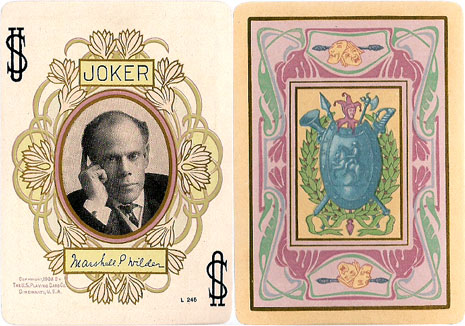
Tales from the Stage
by Rod Starling
This article was originally published in 'Clear the Decks', the Newsletter for 52 Plus Joker (edited by Judy Dawson). Re-published with permission from the author.
I am sure that most, if not all, of the members of our club have one or more specimens from the series of theatrical decks, namely the “Theatrical Playing Cards” for the “Craddock’s Soap” deck, c.1895; “The Stage Playing Cards No.65x” of 1896 as well as of 1908 and “The Movie Souvenir Playing Cards”, c.1925. They represent a wonderful, historical gallery of famous performers and although their day has long past, these decks allow us to ponder with delight over the era when they captivated their audiences before the footlights and on the silver screen. In so pondering, I found a few tidbits from the 1908 Stage deck and two from the Movie Souvenir deck that I would like to share with you.
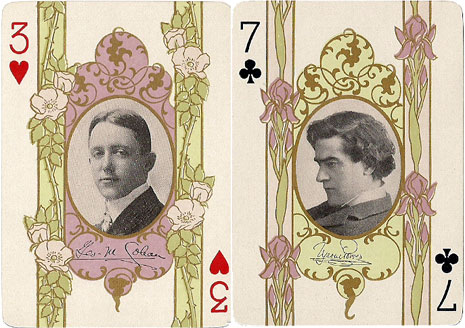
Firstly, the Joker in the 1908 Stage deck pictures Marshall P. Wilder. On July 28, 1910, The New York Times published a report that the actor was dying from acute indigestion and was not expected to live out the night. In fact, he went on to live until 1915. I would say that he had the joke on the Times. Is that why he is the Joker in this deck?
The three of Hearts in this deck pictures George M. Cohan who was an incredibly talented performer, playwright and composer. Many of his works revealed his great patriotic sentiments and love of America. Three of his most popular songs were “Yankee Doodle Dandy, Give My Regards to Broadway” and “Over There”, which he wrote in 1941 when America entered World War II and for which President Roosevelt presented him with the Medal of Honor. In 1960, a statue of George M. Cohan was erected in Times Square, New York City.
The seven of Clubs in this same deck is very interesting. It pictures Tyrone Power. Now that stage actor, born in 1869 and died in 1932, was the father of the more familiar Tyrone Power, born in 1914, a well-known movie star of the 1930’s, 1940’s and up until 1958, the year he died. The stage actor was actually Tyrone Power ll. The movie star was Tyrone Power lll who also had a son, Tyrone Power lV, also himself an actor, who appeared in an episode of the TV sitcom, Cheers. I wonder if he is aware that his grandfather is among the stage stars featured in this beautiful Art Nouveau deck from over one hundred years ago.
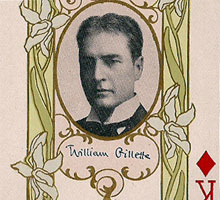
The King of Diamonds from this stage deck pictures William Gillette and is of particular interest to me as an avid Sherlock Holmes fan. William Gillette, with the consent of Arthur Conan Doyle, wrote a play entitled simply “Sherlock Holmes”, in which he played the title role. The very first presentation of the play was at the Star Theater in Buffalo, New York on October 23, 1889. The first presentation of this play in England was in April 1901, at the Lyceum Theater in London. One of the characters in the play was Billy, a page boy, and the role was played by a twelve year old lad named Charlie Chaplin who later migrated to America and achieved great fame in his own right. Mr. Gillette appeared in his “Sherlock Holmes” play for more than 1,300 performances over a period of 33 years. He was considered the very personification of the famous detective and Frederick Dorr Steel, a famous illustrator, used Gillette’s likeness in illustrating the Sherlock Holmes stories that were published in “Collier’s Magazine” during 1903-1905.
Gillette died in 1937 at age 84. His career was very profitable and he built a castle in Connecticut that today is a tourist attraction. It includes a creation of Sherlock Holmes’ famous living room at 221b Baker Street in London, just as Conan Doyle had described it in his Sherlock Holmes stories.
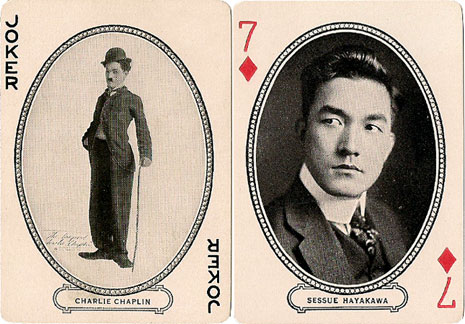
In the “Movie Souvenir Playing Cards”, there are at least two cards of note. First, there is the Joker which pictures Charlie Chaplin, now a man in his thirties and well established as a famous comic character known as “The Little Tramp”. He went on to directing and producing his own films and, in 1919, was one of the founders of United Artists.
The next and final selection, again from the “Movie Souvenir” deck, is the seven of diamonds. It features Sessue Hayakawa, an extremely popular star from Japan who made many movies, both silent and sound. In 1957, he starred, along with Alec Guinness, in The Bridge at the River Kwai in which he brilliantly played the commandant of a Japanese military prison camp. He was nominated for an Oscar as best supporting actor in that role. He was born in 1890 and died in 1973.
There are many other performers pictured in the stage and movie decks. Perhaps some other members may find pleasure in checking out their own copies of the decks and digging up some other information to share with us.
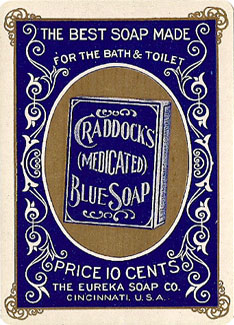
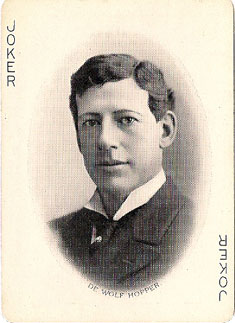
Above: Craddock Soap Stage Souvenir, 1895.
The final deck which should be includes here is the beautiful Craddock’s Blue Soap deck (Hochman SE2 and A4). It is found in two categories, Entertainment and Advertising. It was designed for Craddock’s and published in 1895 by USPC.
It is a lovely deck and is very attractive. Some of the actors and actresses are full face portraits and others are ¾ length shots. These pictures really give us a glimpse into the clothing as well as hairstyles of the period. The dark blue and gold backs are beautiful and with its extra card, this deck really is a winner!
REFERENCES
Dawson, Tom & Judy: The Hochman Encyclopedia of American Playing Cards, U.S. Games Systems Inc., 2000
Images from the collection of Rod Starling, author of "The Art and Pleasures of Playing Cards".
See also: Craddock Soap Stage Souvenir, 1895 • The Stage No.65, 1896 • The Stage No.65, 1908 • Movie Souvenir Playing Cards, 1916

By Rod Starling (1936-2023)
Member since January 09, 2013
Rod Starling was one of the founding members of the 52 Plus Joker card collectors club. He authored many articles for the club's quarterly newsletter, Clear the Decks. His collection encompasses both foreign and American decks. Rod also authored a book titled The Art and Pleasures of Playing Cards.
Related Articles

Sea-Dog playing cards
Ships’ prows, figureheads and signal flags promoting Sea-Dog Line marine hardware.

Modern Swiss-German Pattern (carta.media)
Modernizing tradition: balancing clarity and continuity in regional card design.

Tactics Design
Late modernist Japanese playing cards designed by Masayoshi Nakajo for Tactics Design.

The Decadent Deck
Studies in the eroticism of the female body by Inge Clayton.

Historic Shakespeare
“Historic Shakespeare” playing cards featuring Shakespearean characters by Chas Goodall & Son.

Sunday Night / Nichiyoubi no Yoru
An irreverent, avant-garde deck unofficially titled "Nichiyoubi no Yoru" (Sunday Night), designed by...

Emilio Tadini playing cards
Beautiful dreamlike playing card designs by Emilio Tadini.

Rap Rummy
Rap Rummy made by Parker Brothers in 1926, only 4 years after the discovery of King Tutankhamen’s to...

German Travel Cards
A travel-themed educational deck helping American tourists visiting Germany.

Can You Believe Your Eyes?
“Can You Believe Your Eyes?” playing cards featuring visual illusions & other oddities.

Zürcher Festspiel 1903
Swiss-suited pack designed by Robert Hardmeyer featuring figures from art and politics.

Never Mind the Belote
Limited edition Belote pack with designs by a collective of 24 street artists.

Playing card designs by Franz Exler
Reconstruction of playing cards from the original 1903 designs.

MITSCHKAtzen
Clever cat designs by the Austrian artist and illustrator Willi Mitschka.

22 Pittori in 22 Arcani
Collaborative Tarot with contributions from 22 different Italian artists including Menegazzi and Tav...

Get Decked
Black and white cartoons devised by Sam Wagner with help from artist Lindsay Bevington.
Most Popular
Our top articles from the past 28 days

